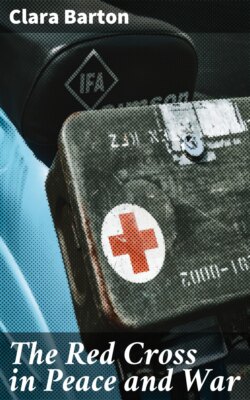Читать книгу The Red Cross in Peace and War - Barton Clara - Страница 10
На сайте Литреса книга снята с продажи.
HELP FROM NEUTRAL COUNTRIES.
ОглавлениеTable of Contents
Neutral countries also during this war were ready and bountiful with help; and those working under the treaty did most effectual service. England contributed 7,500,000 francs, besides large gifts of sanitary supplies; in one hundred and eighty-eight days’ time she sent to the seat of war twelve thousand boxes of supplies through the agents of the Red Cross.
To give an idea of the readiness and efficacy with which the committees worked even in neutral countries, one instance will suffice. From Pont-a-Mousson a telegram was sent to London for two hundred and fifty iron beds for the wounded, and in forty-eight hours they arrived in answer to the request. England kept also at the seat of war agents to inform the committee at home of whatever was most needed in supplies. The neutral countries sent also surgeons, physicians and nurses, and in many other ways gave practical testimony to the benign efficacy of the Geneva treaty.
As will be seen by the foregoing pages, the objects and provisions of the Geneva convention and the societies acting under it, are designed for, and applicable to, the exigencies of war only. The close contact of the nations hitherto signing this treaty, renders them far more liable to the recurrence of war among them than our own, which by its geographical position and distance from neighboring nations, entertains a feeling of security which justifies the hope that we may seldom, if ever again, have occasion to provide for the exigencies of war in our land.
This leads the American Red Cross to perceive the great wisdom, foresight and breadth of the resolution adopted by the convention of 1863, which provides that “Committees shall organize in the manner which shall seem most useful and convenient to themselves;” also in their article on the organization of societies in these pages occurs the following: “To be efficient, societies must have government recognition, must bear the stamp of their national individuality, and be constructed according to the spirit, habits, and needs of the country they represent. This is essential to success.”
As no work can retain its vitality without constant action, so in a country like ours, with a people of so active a temperament, an essential element in endearing to them a work, is to keep constantly before them its usefulness. With this view the question of meeting the want heretofore felt on all occasions of public calamity, of sufficient extent to be deemed of national importance, has received attention at the hands of this association. For this purpose the necessary steps have been inaugurated to organize auxiliary societies, prepared to co-operate with the central association in all plans for prompt relief; whilst the volunteers who shall render personal aid will be expected to hold themselves in the same readiness as in the case of an international call.
It must, however, be distinctly understood that these additional functions for local purposes shall in no manner impair the international obligation of the association; but on the contrary it is believed will render them more effective in time of need.
It may appear singular that a movement so humane in its purposes, so wise and well considered in its regulations, so universal in its application, and every way so unexceptional, should have been so long in finding its way to the knowledge and consideration of the people of the United States. This fact appears to have been the result of circumstances rather than intention. While eminently a reading people, we are almost exclusively confined to the English language. The literature of the Red Cross is entirely in other languages, largely French, and thus has failed to meet the eye of the reading public.
It will be observed that the first convention was called during our war; no delegates were especially sent by the United States, but our Minister Plenipotentiary to Switzerland, acting as delegate, sent a copy of the doings of the convention to our government for recognition. In the midst of civil war as we were at the time the subject was very naturally and properly declined.
